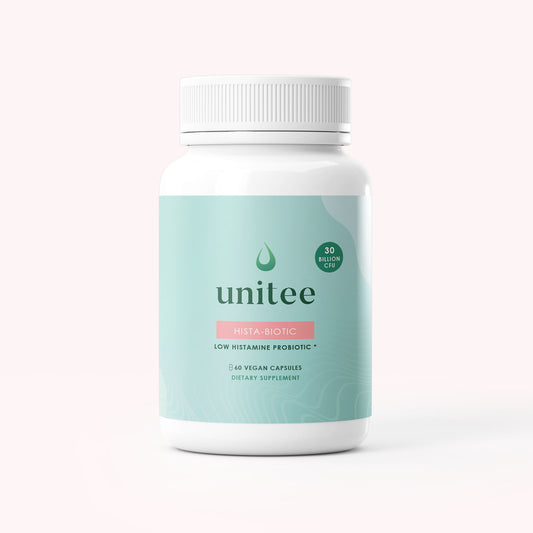Have you heard of the controversial, but increasingly popular carnivore diet?
Many people have such strong opinions either for or against this diet. So, today, I'd like to give you a nutritional scientist's take on it - and, discuss how this diet impacts those with histamine intolerance.
The Carnivore Diet - What is it?
First of all, for those that are unclear on what the carnivore is, the general premise involves eating mainly animal-based foods. Ie. meat, dairy, eggs. It also is referred to by the term animal-based diet.
Different versions of this diet float around: some are more lenient and incorporate additional foods such as chicken and fruits, while some are more strict and only consume meat.
The Carnivore Diet: The Controversy
Of course, this diet is one of the more extreme ones and, is almost the exact opposite of a vegan diet.
As you can imagine, when individuals are discussing highly uncommon, niche topics, the debate surrounding them tends to be much more heated.
For example, everyone can agree that eating whole, natural foods and exercising are positive things.
However, trying to get people to agree on what specific types of food and exercise are best for you - well, that's a whole different ballgame and can quickly become argument central.
And then there are those who cannot tolerate exercise without symptoms, that would have something completely different to say!
Let me note that, as a nutritional scientist, I can honestly say the more you learn about nutrition the more you realize we do not have the answers to what the one universal diet is.
And, the more I deal with people as individuals (as opposed to cohorts), I have come to see that each individual knows themselves best and, if they believe something is or isn't working, they're usually right - even if it's not the general consensus.
I have seen people thrive on a vegan diet. I have also seen people do absolutely terrible on it.
I have seen the same for vegetarian, pescatarian and - yes, carnivore diets.
There are a lot of people out there who have tried all of the above yet only found relief through a restrictive, carnivore diet.
So, let's delve into why that is a little.
Who Benefits from the Carnivore Diet?
Now, I'd like to mention that I'm going to focus on the world of gut health, histamine intolerance and functional disorders here.
I am intentionally not discussing other niches because either A) They are not of relevance to histamine intolerance and / or B) I am not an expert in these areas.
For example, I won't touch on or make statements about if the carnivore diet is more or less beneficial for competitive body builders compared to an omnivore diet.
To get back to it, the majority of individuals I have seen who benefit from this diet are those with an autoimmune disorder (including inflammatory skin conditions), a digestive disorder (ie. SIBO, IBS), or those with a laundry list of food sensitivities.
Once again, this is an analytical discussion and not general advice. Each individual must be treated as such. For example, those with alpha-gal syndrome could literally die from consuming meat and would feel infinitely better by eliminating meat entirely.
The Carnivore Diet and Histamine Intolerance: Can it Help?
One of the reasons people with histamine intolerance (or those with undiagnosed histamine intolerance) might experience a reduction in symptoms is because meat, in itself, is not high in histamine as long as it is fresh and not cured, aged, fermented, or altered in a way that increases histamine levels.
A strict, meat-only diet, in this way, can be very low in histamine.
Another important note is that there is a 58% cross-over between those with irritable bowel syndrome (IBS) and histamine intolerance. There is also a strong link between histamine intolerance and small intestinal bacterial overgrowth (SIBO).
Individuals with IBS or SIBO typically have a tough time tolerating fermentable carbohydrates (FODMAPs) and, often, carbohydrates in general.
In this case, many with IBS or SIBO have reported relief from excess gas production, bloating and discomfort as a result of eating a carnivore style diet.
Once again, we are speaking on an individual basis. If you have an egg sensitivity or an intolerance to lactose, both of which are common, then perhaps your tummy would feel much more painful and uncomfortable from eating this way.
Lastly, and most interestingly, is the reduction in autoimmune symptoms that is repeatedly reported by individuals that switch to a carnivore diet.
Why could this be? We have been told red meat is inflammatory and bad for us all our lives - yet, those with horrible autoimmune conditions and chronic inflammation often seem to find relief through this diet.
Well, one explanation is due to the reduction in the consumption of inflammatory compounds, such as histamine and other amines.
For example, those with psoriasis (an autoimmune condition) often have an intolerance to histamine and other amines in the diet. Removing these from the diet can decrease the inflammatory load a person is experiencing, therefore easing their autoimmune ailments.
If this is the case, individuals could also potentially get relief from trying a low histamine diet which may be a more pleasant, less restrictive and more nutrient-diverse experience.
However, once again, if there are numerous other additional intolerances, the strictness of carnivore diets may temporarily provide further relief.
Another interesting pattern we know about the disorders that seem to be benefitting from the carnivore diet, is that they are typically accompanied by microbial imbalances of the gut.
These imbalances can produce higher levels of inflammatory compounds and cause digestive and immune symptoms, in which case using a well-researched, low histamine probiotic, can be a good way to reintroduce beneficial bacteria that do not contribute to the overall histamine load.
The Carnivore Diet: Who Should Try It?
As my expertise includes histamine intolerance and a low histamine diet, I am no stranger to elimination diets.
However, I do believe these are temporary solutions that can allow your immune system to relax while your body does some healing.
I am yet to be convinced that any extremely restrictive diet has enough evidence to recommend for life, which is why I encourage those with histamine intolerance to heal the underlying root causes.
Additionally, although our body of evidence on the microbiome is still growing, I have seen an overwhelming amount of evidence supporting that the consumption of plants benefits the microbiome.
Not only that, but there is evidence for various plants carrying potent levels of compounds that are anti-inflammatory and healing in many ways.
For example, curcumin, which is found in turmeric, is one of the most potent anti-inflammatory compounds on the planet that we know of.
The brassica family of vegetables (which includes broccoli and cabbage) also shows a host of anti-cancerous compounds as well as bio-regulatory properties that have been evidenced numerous times.
Do I think everyone can tolerate these? Of course not!
Those who are sensitive to oxalates would feel awful with curcumin. Those with SIBO may be uncomfortable from consuming broccoli.
The point is, there really is no one size fits all here.
There are so many claims being made about the carnivore diet and I have no doubt that the majority of those who are reporting improvements are telling a true tale.
Does that mean that everyone should be on this diet? Absolutely not.
Does it mean that some people may try it for symptom relief while incorporating other strategies for long term healing? Perhaps.
The Carnivore Diet and Histamine Intolerance: the Conclusion
The essential conclusion here is that if you are being pushed towards or away from a diet whilst your body is telling you otherwise, it's time to stop listening to any tunnel-visioned influencers or diet advocates and listen to your own body.
If you feel more energetic on a vegan diet, your body may finally be getting the higher quality foods it needed.
If your brain fog clears being a pescatarian, your brain may finally be nourished by those missing omega-3's that were contributing to your symptoms.
If you see symptomatic improvement being a carnivore, your body may finally be getting a break from the carbohydrates and amines that were irritating your gut.
And, I'm not going to deny anyone's experience.
In fact, I will never deny when dozens, hundreds or thousands of people are saying something made them feel better, just because there isn't a paper to prove their claims.
A Note on Keeping an Open Mind to Benefit Your Health...
Often, people forget, that no research papers existed until we went out and created studies to learn more about the topics at hand. Humans and nature existed before any of these studies did.
A lack of evidence is not evidence at all. In fact, all this evidences is our lack of available knowledge on the topic, and our inability to currently draw conclusions.
Noticing patterns in nature, society, illnesses, etc., is usually the catalyst that calls for these studies to be created. So, it's important for us to lean in when we hear an uproar in the health world and listen, pause and research before we jump to respond.
As a completely hypothetical, ridiculous example, I wouldn't create a study on why eating copious amounts of sand each morning makes people feel their best, because nobody is claiming that.
But, hypothetically, if there were hundreds or thousands of reports of people eating sand and seeing their symptoms disappear, then it would probably be best that we, as scientists, look into the phenomenon further before making strong claims (which we don't know) or denying it's efficacy (which we haven't measured).
There are now a small collection of studies coming out on the carnivore diet - however, science takes time. And understanding long-term impacts also requires longevity.
So, for now, it's okay to say we don't know all of the facts.
Additionally, it is important to consider the long term impact of undertaking any restrictive diet.
If there is insufficient evidence to provide confidence for long-term use, then it is best to limit these diets to short-term, therapeutic uses rather than to rely on them as a lifelong solution.
Maybe my mind will change as the science progresses and we discover more. But, for now, I encourage you to listen to your body. It's smarter than you think!

Anita Tee
My name is Anita Tee. I'm a nutritional scientist who specializes in histamine intolerance. I hold a Master of Science in Personalized Nutrition and a Bachelor of Science in Human Biology and Psychology.For the past ten years, I have used my experience in nutritional and medical health sciences to create a scientifically backed, natural approach to healthcare that relies 100% on evidence-based research.As I previously suffered from - and overcame - histamine intolerance, my focus is to increase recognition and expand the available resources and protocols available for resolving this particular disorder. To date, I have helped over 4,000 individuals fully resolve or better manage their histamine intolerance symptoms.









